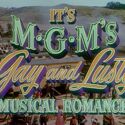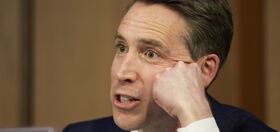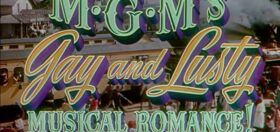
A simmering row at the supreme court has resulted in a decision by the Queen to give all justices “courtesy titles” of lord or lady.
Justices at the court are reported to have been upset that the move away from the House of Lords, where the UK’s most senior judicial committee used to sit, resulted in a discrepancy among titles.
Sources say there was disquiet at the court that John Dyson – the only new appointee since the court was established last year and the only justice without a title of lord – appeared to be singled out.
How about we take this to the next level?
Our newsletter is like a refreshing cocktail (or mocktail) of LGBTQ+ entertainment and pop culture, served up with a side of eye-candy.
There are also claims that the variation in titles caused confusion among lawyers appearing at the court, with some unsure how to address the justices.
Complaints are reported to have culminated in a decision to ask the Queen to confer the title of lord and lady on all justices of the supreme court to “avoid confusion” about the proper address for judges.
Last month Buckingham Palace signed a warrant declaring that every justice of the supreme court of the UK will in future be given the address.
Critics are furious at the move, which they say discriminates against the husbands and possible civil partners of judges. While male justices will become lord and be able to confer titles on their wives, civil partners or the husbands of female justices will not have the same right.
“It is a retrograde step for the court to revert to using titles with aristocratic associations at odds with the more modern and forward-looking image which the supreme court has worked hard to present,” said Kate Malleson, professor of law at Queen Mary, University of London.
“There will be a clear discrimination between heterosexual male justices and female, gay or lesbian justices. The former will be able to bestow the title lady on their wives whereas the husbands and civil partners of the latter categories will be titleless.”
Gay rights campaigner Peter Tatchell said: “It’s quite outrageous that the supreme court judges have a title system that discriminates against both women and gay people. The highest court in the land should reflect the principle of universal equality.
“Complicity with this discrimination sends out entirely the wrong message. When inequality is enshrined at the heart of the supreme court, it does not inspire confidence that this institution is committed to non-discrimination.”
But the supreme court and Buckingham Palace defended the decision, stating that the use of courtesy titles would reduce confusion and that the different rules for men and women were a matter of convention, decided upon after constitutional advice from ministers.
Others suggested that granting peerages to all justices would be a more appropriate way to solve the problem. “As the supreme court is the highest court in the land and the judges are all still given knighthoods, I think something to single out its members is necessary and justified,” said Sir Geoffrey Bindman, founder of Bindmans law firm. “But if you are going to call them lord, why not give them a peerage. It seems a bit anomalous not to do so.”
guardian.co.uk © Guardian News and Media Limited 2010


















Cam
“”While male justices will become lord and be able to confer titles on their wives, civil partners or the husbands of female justices will not have the same right.”””
________________
Funny, Elton John said that the civil partnerships were EXACTLY the same. It would appear this is not so.
Ted B. (Charging Rhino)
Rather than the honorific, “my Lord”, why not allow them the male spouses and male civil partners the honorific of “Sir”. The female spouses of Baronets and Knights are addressed as “my Lady”, so it would preserve the symmetry, while respecting the higher-honorific of “Lord” Justice.
Ambrose
“Does the . . . justices titles discriminate . . .?” How about learning a modicum of basic grammar for Christ’s sake? I believe subject-verb agreement and the use of the possessive apostrophe are covered in most schools no later than the 4th grade.